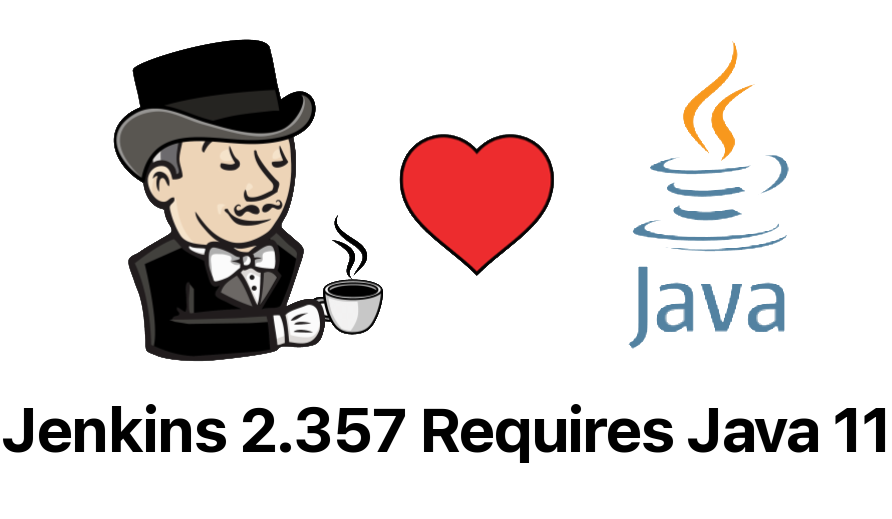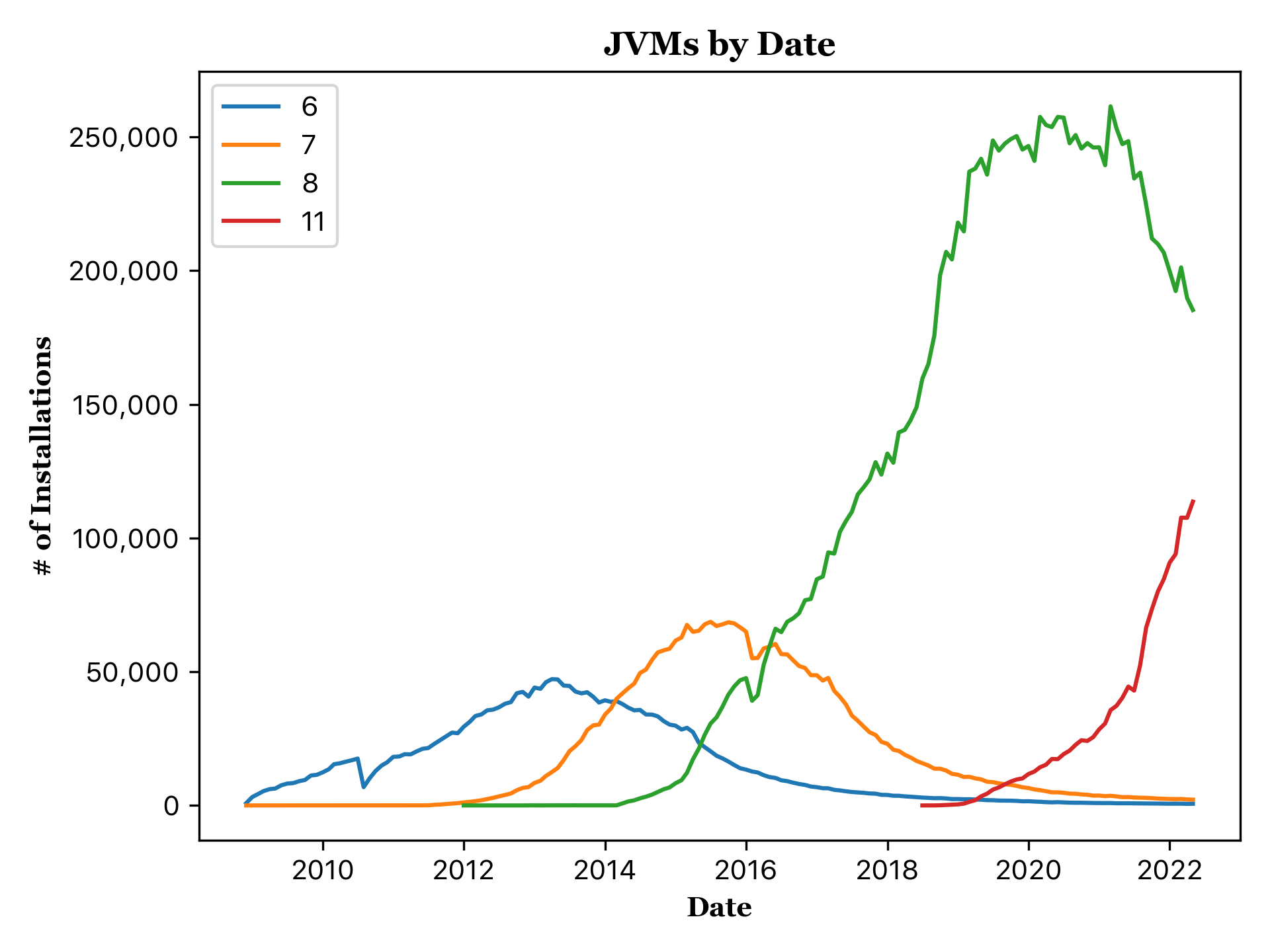Introduction

The Jenkins project is committed to delivering a world-class platform experience for end users and developers alike. At the core of this experience is Java, an object-oriented programming language with a cross-platform runtime in the form of the Java virtual machine (JVM). Since its inception, the Jenkins project has been a major consumer of Java, distributing over 1,800 plugins to an installed base of over 300,000 controllers, and Jenkins regularly appears on lists of the top Java applications of all time.
Beginning with Jenkins 2.357 (released on June 28, 2022) and the forthcoming September LTS release, Jenkins requires Java 11. Additionally, beginning with Jenkins 2.355 (released on June 14, 2022) and Jenkins 2.346.1 LTS (released on June 22, 2022), Jenkins supports Java 17. Plugins have already been prepared in JENKINS-68446.Use the Plugin Manager to upgrade all plugins before and after upgrading to Jenkins 2.357.
Long-time Jenkins users and Java developers may recall previous migrations to Java 7 and Java 8. While these migrations were not trivial, they pale in comparison to the magnitude of the migration to Java 9 and beyond. Java 9 represents a sea change in the Java ecosystem across many dimensions. Not only are there changes to licensing policies, versioning schemes, release cadences, and long-term support (LTS) cycles, but also there are a number of significant technical changes to the language and runtime (e.g., Project Jigsaw), not all of them retaining the high levels of compatibility that characterized previous releases. Although these evolutionary changes are likely to be in the best interests of the Java community in the long term, it is nevertheless incumbent on the community to be aware of the impact and to plan accordingly.
In this blog post, we will discuss the Jenkins project’s migration to Java 11 and Java 17, reflecting on it in the context of previous Java migrations within the Jenkins project and the Java community more broadly. We will summarize the benefits and risks and describe the upgrade process. Finally, we will share a glimpse at what is coming in future releases.
History
Since its inception in 2005, the Jenkins (then Hudson) project has gone through a number of Java migrations. To a large degree, the present migration is consistent with historical precedent within the Jenkins project. For years the Jenkins project has published anonymous usage statistics, as described in a piece by R. Tyler Croy and recently revised by Andrew Bayer, which enable us to quantify past and present trends.
Data

Analysis
The above data reveals that the lifecycle of each major Java version is clearly a Gaussian function. Each major version of Java is released by the vendor, begins a phase of rapidly growing adoption, reaches a usage peak, loses support from the Jenkins project, begins a decline in usage, declines in usage to a terminal state, and finally reaches vendor end-of-life (EOL), in roughly that order.
| Java 6 | Java 7 | Java 8 | Java 11 | |
|---|---|---|---|---|
Vendor release date | December 11, 2006 | July 7, 2011 | March 18, 2014 | September 25, 2018 |
Rapid adoption | October 2009 | February 2013 | February 2015 | November 2019 |
Peak usage | March 2013 | June 2015 | February 2021 | N/A |
Jenkins weeklies require next major version | May 2015 | April 2017 | June 2022 | N/A |
Terminal decline in usage | May 2016 | March 2019 | N/A | N/A |
Vendor End of Life (EOL) | December 31, 2015 | July 31, 2019 |
| These options are explained in-depth in the Oracle Java documentation as well as the CloudBees Jenkins JVM guide. |
Agents
For best results, it is recommended to run agents with the same version of Java as the version used on the controller. Use the Versions Node Monitors plugin to verify that agents are running a compatible version of Java.
| Running the Jenkins remoting process on an agent with Java 11 or 17 does not imply that you need to run your builds with the same version of Java. You can continue to use any desired version of Java for individual builds. |
Reporting issues
If you find a regression in a plugin, please file a bug report in Jira:
When reporting an issue, include the following information:
Use the JENKINS-67688 epic.
Provide the output of
java -version(e.g., OpenJDK 64-Bit Server VM build 11.0.15+10-Ubuntu-0ubuntu0.22.04.1)Provide the name, version, and architecture of the operating system you are using (e.g., Ubuntu 20.04.4 LTS x86_64).
Provide the complete list of installed plugins as suggested in the bug reporting guidelines.
Provide the complete stack trace, if relevant.
Provide steps to reproduce the issue from scratch on a minimal Jenkins installation; the scenario should fail on Jenkins 2.356 or earlier when the steps are followed on Java 11 or Java 17 and pass when the steps are followed on Java 8.
Future work
We expect to see usage of Java 11 continue to grow until it reaches a peak. We expect to see usage of Java 8 continue to decline until it reaches a terminal state, as was the case for Java 7 and Java 6. We expect to see usage of Java 17 transition from minimal levels to significant levels. To reach our goal of Java 17 as the recommended Java version, we need cooperation from both Jenkins users and contributors alike. The development work for Java 17 support is tracked in the following Jira epics:
If you have made it this far through this post, you are clearly enthusiastic about the Jenkins platform experience. If you have never contributed, why not? We would love to work with you. Join one of our Platform Special Interest Group (SIG) meetings to learn more.
Conclusion
We expect to see a bit of disruption from these changes but hope that in the long term they will be in the best interests of the Jenkins community. Please reach out on the developers' list with any questions or suggestions.
Acknowledgments
As noted above, members of the Jenkins community began working on Java 11 support in 2018, well before the present author’s involvement in the project and well beyond the present author’s ability to identify and name everyone who was involved in the effort. In addition to the many plugin maintainers who merged and released JAXB fixes in a timely fashion, we would like to thank the following regular contributors for their recent efforts:
Adrien Lecharpentier
Alexander Brandes
Alex Earl
Andrew Bayer
Baptiste Mathus
Carroll Chiou
Damien Duportal
Daniel Beck
Devin Nusbaum
Dr. Ullrich Hafner
Jesse Glick
Kevin Martens
Mark Waite
Oleg Nenashev
Olivier Lamy
Tim Jacomb
Vincent Latombe
Thank you! It would not have been possible without you.